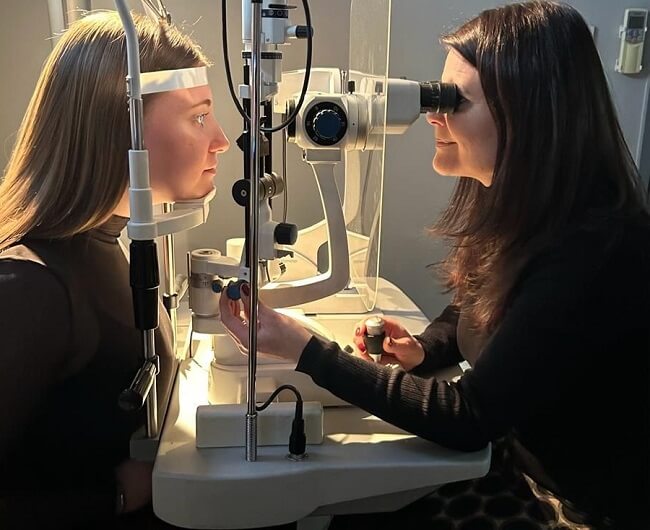Routine eye examinations play a pivotal role in safeguarding eye health and identifying potential issues at an early stage. Here at The Big Optician, we emphasise the significance of comprehensive eye examinations to deliver top-tier care. By recognising the importance of these exams and gaining insight into the specific tests we perform, individuals can proactively prioritise their eye health, promoting overall wellbeing and enabling early intervention when needed.
Let’s take a look at the examinations we offer and what you can expect during your next appointment.

Why are thorough and regular eye examinations important?
Thorough and regular eye examinations are essential for several reasons. First, they enable the early detection of various eye conditions, allowing for prompt intervention and management. Many eye diseases, such as glaucoma, cataracts and diabetic retinopathy, often develop without noticeable symptoms in their early stages. Regular eye examinations help identify these conditions before they progress to more advanced and potentially irreversible stages. Additionally, eye examinations can detect refractive errors like myopia, hyperopia, and astigmatism, ensuring that individuals have accurate prescriptions for corrective lenses.
How long does an adult eye examination take?
Our standard adult eye examinations typically last 30 minutes, while our advanced eye examinations take around 45 minutes. During this time, our fully qualified and experienced optometrists conduct a series of tests to assess various aspects of eye health and vision.
Our team consists solely of fully qualified and experienced optometrists. Your eye examination will take place in a calm and unhurried setting, ensuring that our optometrists have the time and dedication to ensure precision and accuracy in their assessments.
Understanding the different types of eye tests
We offer both comprehensive NHS and private eye examinations.
Our comprehensive exams include:
Digital Retinal Photography
As part of our standard eye examination, we include digital retinal photography using a Kowa fundus camera. This advanced technology provides a detailed image of the retina, aiding in the early detection of eye diseases.
Eye Pressure Measurement
We use the latest patient-friendly technology to measure eye pressures. We perform ‘no puff’ eye tests which is a painless process without the need for the traditional ‘puff test’.
Visual Field Screening
Indicated as necessary, our eye examinations may include visual field screening using the Henson 900 and/or Humphrey FDT Perimeter. These tests assess peripheral vision and help identify abnormalities.
Our advanced eye examinations include:
Optical Coherence Tomography (OCT)
In addition to the tests mentioned above, The enhanced eye examination goes beyond the standard tests, incorporating optical coherence tomography (OCT) using the Topcon Maestro OCT. This advanced imaging technique provides detailed cross-sectional images of the retina, aiding in the early detection of subtle changes.
How often should you have an eye examination?
The frequency of eye examinations depends on various factors, including age, overall health, and existing eye conditions. As a general guideline, adults should undergo a comprehensive eye examination at least every two years. However, individuals with specific eye conditions, a family history of eye diseases, or systemic health issues may require more frequent examinations.
The NHS recommends, as a general guideline, an eye examination every two years. This may be more frequent if you suffer from certain medical conditions or if you have a family history of certain medical conditions affecting the eyes
Book your appointment
Booking an appointment for a comprehensive eye examination is a simple step toward prioritising your eye health. Call us on 0191 224 4555 or visit our ‘Request an Appointment’ page to schedule your eye examination. Our dedicated and experienced team is committed to providing unhurried, precise, and top-notch eye care for all our patients.

